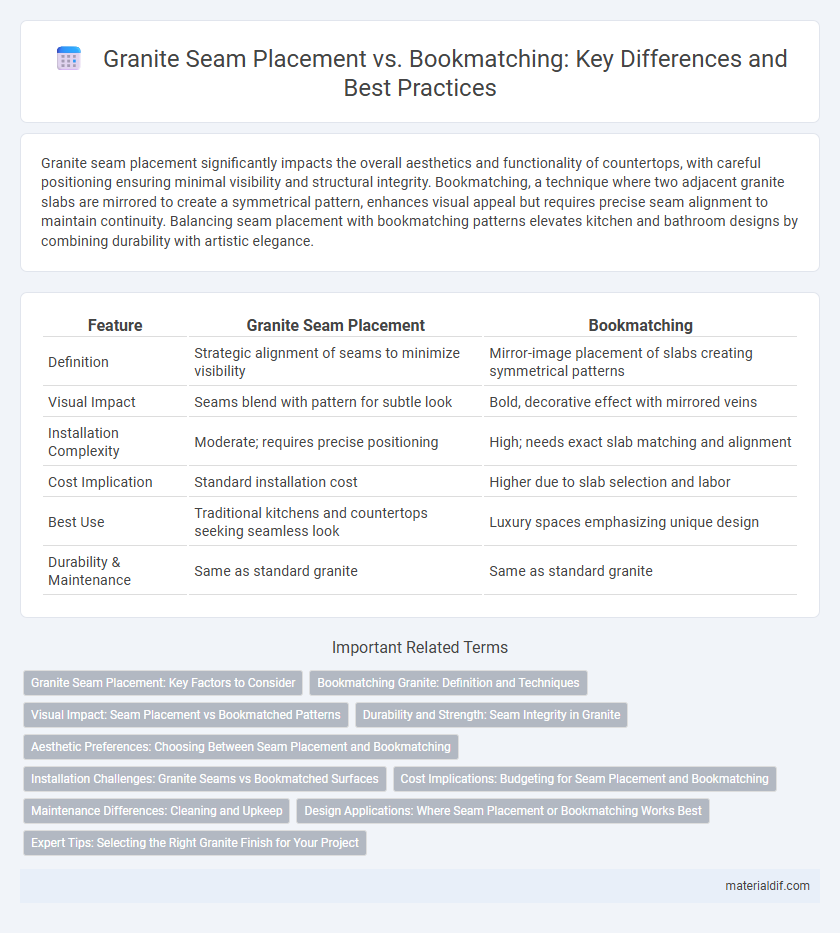Granite seam placement significantly impacts the overall aesthetics and functionality of countertops, with careful positioning ensuring minimal visibility and structural integrity. Bookmatching, a technique where two adjacent granite slabs are mirrored to create a symmetrical pattern, enhances visual appeal but requires precise seam alignment to maintain continuity. Balancing seam placement with bookmatching patterns elevates kitchen and bathroom designs by combining durability with artistic elegance.
Table of Comparison
| Feature | Granite Seam Placement | Bookmatching |
|---|---|---|
| Definition | Strategic alignment of seams to minimize visibility | Mirror-image placement of slabs creating symmetrical patterns |
| Visual Impact | Seams blend with pattern for subtle look | Bold, decorative effect with mirrored veins |
| Installation Complexity | Moderate; requires precise positioning | High; needs exact slab matching and alignment |
| Cost Implication | Standard installation cost | Higher due to slab selection and labor |
| Best Use | Traditional kitchens and countertops seeking seamless look | Luxury spaces emphasizing unique design |
| Durability & Maintenance | Same as standard granite | Same as standard granite |
Granite Seam Placement: Key Factors to Consider
Granite seam placement requires careful consideration of slab size, pattern flow, and visual impact to maintain the natural beauty and structural integrity of the surface. Factors such as the layout of the countertop, the direction of the granite's veins, and the location of high-traffic areas influence where seams should be positioned for durability and aesthetics. Proper seam placement enhances the overall design by minimizing visibility and creating a seamless appearance that highlights the granite's unique characteristics.
Bookmatching Granite: Definition and Techniques
Bookmatching granite refers to the technique of aligning two adjacent slabs in a mirrored pattern to create a visually striking and symmetrical design, often used in countertops and wall cladding. This method involves precise cutting and polishing to ensure the natural veining and patterns of the granite align perfectly, enhancing the aesthetic appeal and making each installation unique. Skilled fabricators use specialized machinery and careful layout planning to achieve flawless bookmatched seams that highlight the stone's natural beauty while maintaining structural integrity.
Visual Impact: Seam Placement vs Bookmatched Patterns
Seam placement in granite installations minimizes disruption in natural patterns, creating a more cohesive and continuous visual flow across surfaces. Bookmatching aligns two consecutive granite slabs to mirror each other, producing a dramatic, symmetrical pattern that serves as a focal point. Choosing between strategic seam placement and bookmatched patterns depends on the desired aesthetic impact and the natural veining of the granite slabs.
Durability and Strength: Seam Integrity in Granite
Granite seam placement and bookmatching significantly impact the durability and strength of countertops by influencing seam integrity. Proper seam placement minimizes weak points where stress and moisture can penetrate, ensuring long-lasting structural stability. Bookmatching, while visually striking, requires precise alignment and high-quality adhesives to maintain seam strength and prevent potential fractures over time.
Aesthetic Preferences: Choosing Between Seam Placement and Bookmatching
Granite seam placement influences the visual flow by minimizing interruptions, creating a seamless, natural stone appearance preferred for subtle elegance. Bookmatching showcases mirrored patterns from a single slab, enhancing dramatic and symmetrical visuals ideal for bold, artistic statements. Aesthetic preferences depend on whether homeowners prioritize understated continuity or striking pattern repetition in their granite installations.
Installation Challenges: Granite Seams vs Bookmatched Surfaces
Granite seam placement requires precise alignment to minimize visibility and ensure structural integrity, often demanding skilled craftsmanship to handle the heavy slabs without damaging the stone. Bookmatched surfaces, created by slicing a single granite slab and mirroring the patterns, present challenges in perfect pattern continuity and require meticulous edge polishing to maintain seamless visual flow. Both installation methods necessitate advanced tools and expertise to address the weight, fragility, and complex matching patterns inherent in premium granite applications.
Cost Implications: Budgeting for Seam Placement and Bookmatching
Granite seam placement typically incurs lower costs than bookmatching due to simpler cutting and less waste, making it a budget-friendly option for large surface installations. Bookmatching demands precise slab selection and alignment, increasing labor and material expenses, often doubling project costs compared to standard seam placement. Budgeting for granite installations should account for these cost implications, especially when aiming for aesthetic continuity versus affordability.
Maintenance Differences: Cleaning and Upkeep
Granite seam placement affects maintenance by influencing the ease of cleaning and the visibility of dirt buildup, with well-placed seams minimizing grout exposure and reducing staining risks. Bookmatching creates symmetrical patterns that can highlight seams, requiring more frequent cleaning to maintain seamless visual appeal and prevent grime accumulation. Proper sealing is essential for both methods to protect against moisture and staining, but bookmatched granite may demand more meticulous upkeep to preserve its aesthetic integrity.
Design Applications: Where Seam Placement or Bookmatching Works Best
Granite seam placement is ideal for large slabs and countertops where structural strength and minimizing visible joints are crucial, such as kitchen islands and commercial flooring. Bookmatching creates a striking visual effect by mirroring the natural veining patterns, making it perfect for focal walls, fireplace surrounds, and high-end bathroom vanities. Understanding the interplay between seam placement and bookmatching enhances design applications by balancing durability with aesthetic appeal in residential and commercial spaces.
Expert Tips: Selecting the Right Granite Finish for Your Project
Granite seam placement plays a crucial role in maintaining visual continuity and structural integrity, with experts recommending seams be positioned in less visible areas to enhance aesthetic appeal. Bookmatching creates a striking symmetrical pattern by aligning two adjoining granite slabs with mirrored veins, ideal for feature walls or countertops requiring a bold statement. Selecting the right granite finish, such as polished for a sleek look or honed for a matte effect, should be based on the project's functional requirements and design goals to ensure both beauty and durability.
Granite Seam Placement vs Bookmatching Infographic

 materialdif.com
materialdif.com